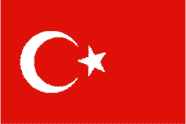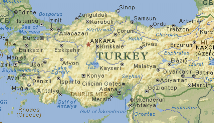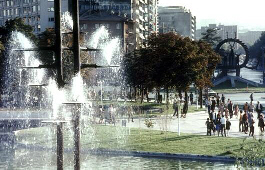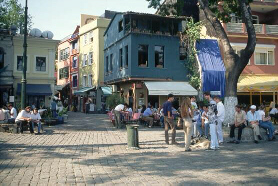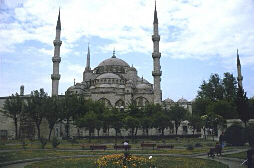|
|
All About Turkey
Official name: the Republic of Turkey (Türkiye Cumhuriyeti) Location: Turkey is a country in southeastern Europe and southwestern Asia, bordered on the northwest by Bulgaria and Greece; on the north by the Black Sea; on the northeast by Georgia and Armenia; on the east by Iran and the Azerbaijani exclave of Naxçivan; on the south by Iraq, Syria, and the Mediterranean Sea; and on the west by the Aegean Sea. The total area of Turkey is 779,452 sq km. Capital: Ankara. Currency: turkish lira (TL) which is divided into 100 kurus
The main area of Turkey, known as Anatolia, is in Asia between the Mediterranean and Black seas. Turkish Thrace in Europe makes up about 3% of the country's area. Turkey has relatively rich agricultural resources and important deposits of black coal, iron ore, and chromium; some petroleum is found in the southeast. With several active seismic zones within its boundaries, Turkey is subject to frequent earthquakes.
Turkey has been home to ethnically and culturally distinct groups from the ancient Hittites, Phrygians, and Assyrians to Greeks, Persians, Romans, and Arabs. The nomadic forebears of the modern Turks came out of Central Asia in the 11th century AD, conquered Arab and Byzantine empires, and set themselves up as rulers. Their arrival placed the distinctive stamp of Turkish language and culture on the population they found there, and it was the instrument by which Islam replaced Christianity in this territory. More than 20% of the population in the early 1990s, however, belonged to various ethnic groups that continue to maintain their individual identity, particularly the Kurds, Greeks, Arabs, Armenians, and Jews. Turkey's population is
66,620,120 (2000 estimate). The highest population
The official language of Turkey is Turkish. In addition, about 10% of the population speaks a different primary language, usually Kurdish or Arabic.
Islam ceased to be the official state religion of Turkey in 1928. Nevertheless, 99% of the population is Muslim (about four-fifths of whom are Sunnites, and the remainder mostly Shiites found in the southeast). Christians account for less than 0.2% of the population. The Jewish community numbers about 20,000.
Atatürk, the leader of the new republic, stressed the need for modern education. By 2000, 85% of the adult population could read and write. Primary education through the first five grades is compulsory. Entrance to Turkey's universities is extremely competitive. Major institutions are the University of Istanbul (1453); the Aegean University (1955), at Izmir; the University of Ankara (1946) and the Middle East Technical University (1956), at Ankara.
Turkey maintains state operas in Istanbul and Ankara, the Academy of Fine Arts in Istanbul, three music conservatories, a national folk dance troupe, and other cultural institutions. Christian churches converted to mosques, and mosques built by the famous 16th-century Turkish architect Sinan, are in Istanbul, Edirne, Bursa, and other cities. The Sultan's Palace (Topkapi Sarayi) is now a museum housing the imperial treasures and relics of the Prophet Muhammad. Ankara's Museum of Anatolian Civilizations has outstanding Hittite, Phrygian, and other exhibits.
Turkey's manufacturing sector has grown considerably since 1950, but in the early 1990s farming still engaged nearly half the labor force. The government has a great deal of influence over the Turkish economy and owns several important industries. In the mid-1990s the economy was beset by a growing budget deficit and an annual rate of inflation as high as 150%. In response, the government initiated austerity measures that included accelerating the pace of a privatization program and increasing the price of goods produced or sold by government enterprises.
Ancient civilizations
such as the Hittite, Phrygian, and Lydian, flourished in The Ottoman Empire collapsed as a result of World War I (1914-1918), loosing most of its territory. The sultanate fell after the Turkish War of Independence, led by Mustafa Kemal (Atatürk). The Turkish Republic was proclaimed on October 29, 1923. Modernization efforts followed, such as abolishing the religious courts in 1924. Women gained the right to vote in 1934. Turkey became a secular state in 1928, and a multiparty political system was established in 1950. Apart from a brief period of government by a military junta in 1960 and 1961, Turkey remained under civilian rule until 1980, when, in a period of political instability, inflation, and acts of terrorism, the military again took control. Civilian rule was restored to Turkey at the end of 1983.
To know more about Turkey, check this links: Source: Microsoft Encarta Online Encyclopedia 2000.
Who is Tarkan? | His Music | How I knew about him | What's New | Links | Home © El Palacio de Tarkan |

